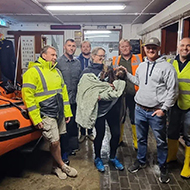
Woody fell off a cliff, and had been missing for three days.
A sprocker spaniel has been rescued by the Royal National Lifeboat Institution (RNLI), after falling off a cliff in north Cornwall and going missing for three days.
Woody, a nine-month-old sprocker spaniel, was out on a coastal walk with his owners when he disappeared from their view. After searching for more then 24 hours, Woody's owners were incredibly distressed, unsure if they would ever see him again.
Jon, Woody's owner, said: “We felt sick to the stomach going back without Woody. Then we had a phone call telling us that a dog had been heard barking down a cliff.
“Words can’t express how delighted and overjoyed we were.”
After falling 150ft down the cliff, and having been missing for three days, Woody was eventually discovered when a walker heard him barking. A farmer local to the area kindly used a drone to locate Woody, and found him inside a steep-sided cove.
The farmer notified the RNLI, and Port Isaac's RNLI volunteer crew navigated their D class inshore lifeboat through a large swell to rescue Woody.
RNLI crew member Ben Spicer commented on the rescue: “Woody gave us a good run around to start off with as he was understandably distressed, cold, tired and hungry.
“It felt fantastic to get Woody out of there and back to his owners. I can only imagine how horrid it must have felt not knowing his circumstances over those days
“It was a great team effort with multiple organisations involved, Cornwall Search Dogs, DogLost Cornwall, Boscastle CG and the RNLI all working harmoniously and achieving a positive outcome. It could have very easily gone the other way for Woody.”
Jon thanked the crew who saved Woody: “The whole thing is a miracle: it’s amazing that he survived the fall, the couple of nights alone and that he was rescued. How on earth?
“We can’t thank the RNLI crew enough. We’ve always donated to the RNLI. I’ve been a Shoreline member for years and when my wife’s father died, we donated as well, never knowing that we would need them to rescue our dog.”
Image (C) RNLI.



 A free webinar exploring the development of the Kennel Club's registration system and the evolution of closed breed registers has been announced.
A free webinar exploring the development of the Kennel Club's registration system and the evolution of closed breed registers has been announced.